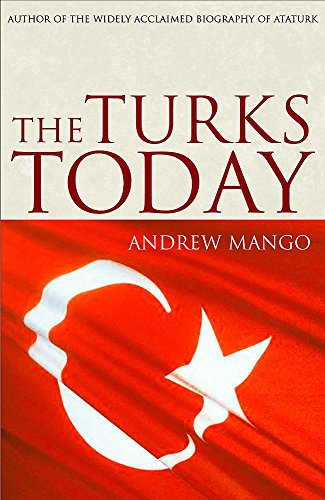The Turks Today : After Ataturk - Hardcover

"synopsis" may belong to another edition of this title.
Most people who have rubbed elbows with Turks might suggest that they are experiencing an identity crisis, torn between the East and the West. In contrast, Mango, who was born in Istanbul, says the Turks have a strong sense of national identity. The Turks are "a distinct people with a Muslim background," he writes, who think like the West more so "than do their Muslim neighbors to the east and south." In the post-Sept. 11 world, Turkey indeed stands out. To what does the country owe its uniqueness?
Turkey's position between Europe and the Middle East is a major factor. However, Kemal Ataturk's legacy of secular democracy in a Muslim society is even more important.
Clearly, Ataturk was a visionary politician, but why has Turkey managed to remain a secular democracy more than 60 years after his death? Why has it not fallen like Iran's pro-Western regime, which collapsed like a house of cards in 1979, or declined like Egypt, an intellectual powerhouse in the 1930s that is now a crumbling edifice? Well, Ataturk got it right. He made Turkey a secular republic in the 1920s, long before it became a democracy in 1950. Hence, even after Ataturk's own Republican People's Party (CHP) lost Turkey's first free multiparty elections in 1950, secularism was able to survive. Not only that, it was now armed with democracy to defend itself. For example, when members of the Muslim Ticani order started mutilating Ataturk's statues in 1951 and attacking secularism, the Democrat Party, which had just defeated the CHP, passed a law to protect Ataturk's legacy.
And more recently, when the Turkish military challenged the Islamist Welfare Party government in 1997, it found many allies within the country, ranging from secular political parties and media to NGOs and women's groups. Women's participation in the anti-Islamist alliance was not an accident. Turkish women are "much more emancipated and better able to realize their potential" than women in other Muslim countries, Mango writes.
The second reason why Turkey works is the Alevis. Little known outside the country, Alevis are liberal Muslims who profess a syncretic version of Islam laden with elements of Sufism and Shamanism, the Turks' pre-Islamic faith. Alevis shun fundamentalism and cherish secularism. According to Mango, they represent a "distinctively Turkish humanist Islam open to modernity."
While planting the seeds of secular democracy, Ataturk found inspiration in 19th-century French and European sociology. Therefore, contemporary Turkey shares many similarities with France, including administrative practices and legal structures. Along the same line, secularism in Turkey, like the French concept of laicité, provides freedom from religion.
Just as Turkey learned from Europe in the past, that continent, grappling with a growing and restless Muslim community, can now turn to Turkey for ideas. Turkish secularism has created a tradition of "state Islam" whereby the government builds and staffs mosques to curb the influence of jihadist preachers. Meanwhile, Turkish Islam "has learnt to live in a secular state in a society where secular values prevail," Mango writes. Turkey has much to offer France and the European Union.
Even so, Turkey's path to the E.U. is full of uncertainties. Although Ankara, which applied to join in 1987, was recently invited to start accession talks in October 2005, resistance to Turkey's membership is rife in Europe -- ironically, especially in France. Most Europeans say, for instance, that Ankara's human- rights record is too negative. "Turkish citizens are at least as free as their neighbours in the Balkans," Mango contends. Other critics say that Ankara is too poor for Brussels. Turkey surely has catching up to do with Europe. It needs to improve its economy and reform its heavily centralized, inefficient government, which Mango sees as a drain.
All the same, Turkey is a southern European country. Like Greece and Spain, it has a history of military involvement in politics; like Portugal's, its economy is dominated by large family-owned conglomerates; and like Italy, it possesses an intricate network of social structures.
For the Turks, joining the E.U. is not about entering Europe; it is about going back to Europe. Almost half of them are of European descent, ranging from Hungarian Muslims and Bosnians to Greek Muslims and Balkan Turks, who have been driven out of the continent ever since the territorial demise of the Ottoman Empire started in the late 17th century. Even in its worst days in the 19th century, Turkey was known as the "sick man of Europe," not the sick man of the Middle East. The Turks might well be ready for Europe; the Europeans, though, do not seem ready to take them into their midst. As Andrew Mango makes clear, modern Turkey is not an oddity; it is, however, a rare kind of nation that deserves special attention.
Reviewed by Soner Cagaptay
Copyright 2005, The Washington Post Co. All Rights Reserved.
"About this title" may belong to another edition of this title.
- PublisherTRAFALGAR SQUARE +
- Publication date2004
- ISBN 10 0719562295
- ISBN 13 9780719562297
- BindingHardcover
- Rating
Buy New
Learn more about this copy
Shipping:
US$ 23.00
From Canada to U.S.A.
Top Search Results from the AbeBooks Marketplace
Turks Today
Book Description Hardcover. Condition: New. Seller Inventory # XBY--037

